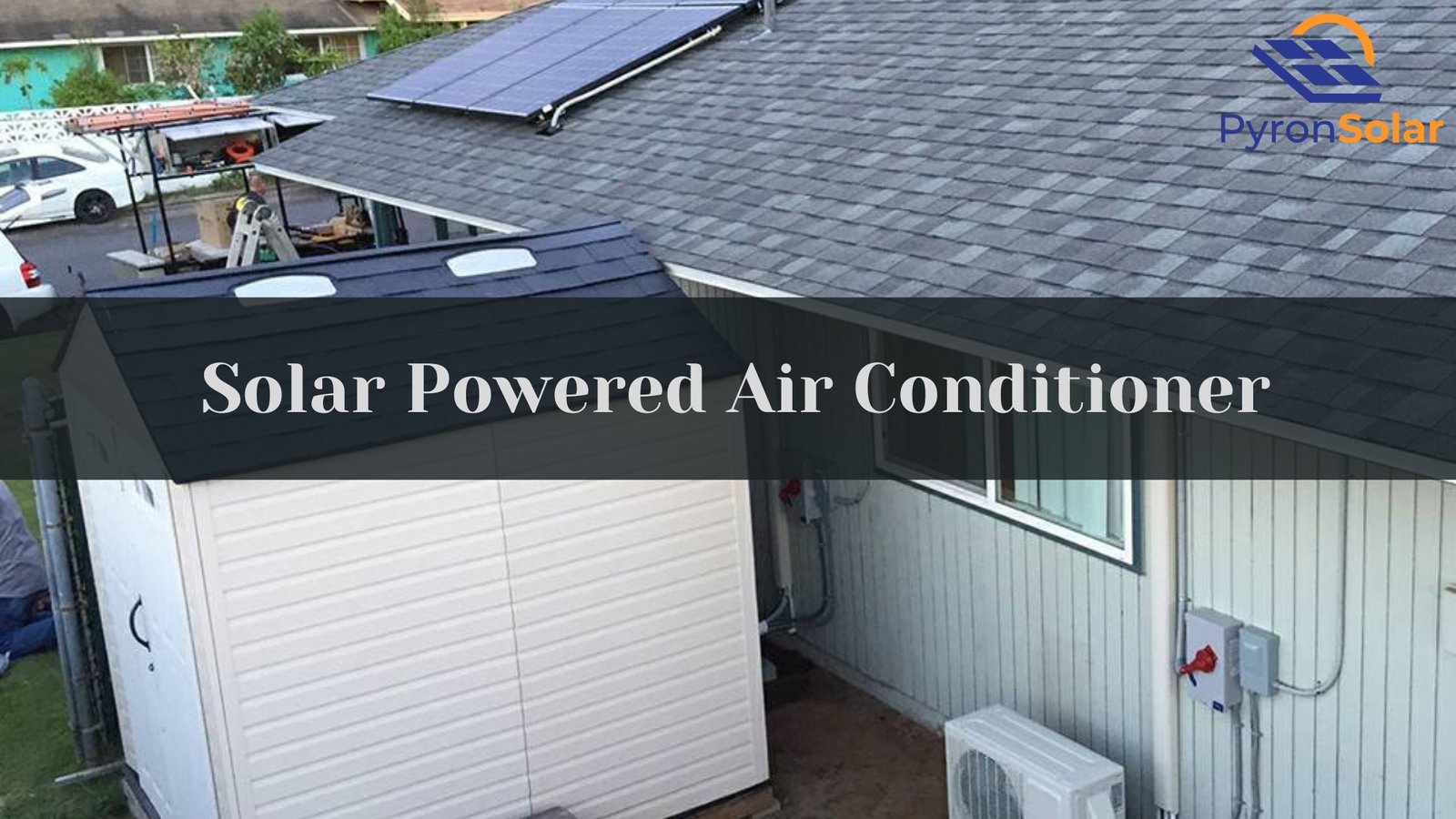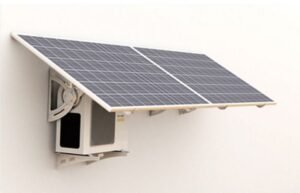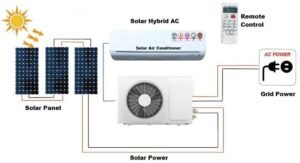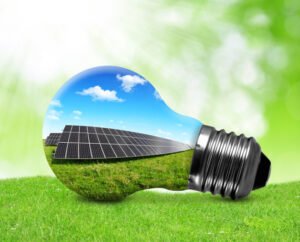During summer, most people, even me, prefer staying cool at home; thus, I always want my air conditioner (A.C.) to perform efficiently.
However, due to the electricity prices increase, sometimes I wonder if I can install solar panels for A.C.. Do you also think about it?
Yes, an air conditioner can be operated by a solar panel, but it will consume a significant portion of the panel’s capacity. An average solar panel system generates approximately 2 and 4 kilowatts of power, whereas air conditioning units typically require around 1.2 and 2.5 kilowatts. So, we must ensure that our solar panel system can support a powerful air conditioner if we possess one.
The use of solar panels to power our household, vehicle, or outdoor area is an “eco-friendly” alternative that can offer us the same advantages as any other power source. Using solar panels for our air conditioning units is one of the most significant ways to power our household sustainably.
In addition to the fact that we overspend on air conditioning, energy usage does hurt the environment. According to reports, air conditioners also emit approximately 117 metric tonnes of CO2 into the atmosphere yearly, which is terrible for the environment.
On the contrary, we can find sustainable and efficient alternatives to powering our air conditioners and other electrical things by using solar panels.
To learn more about solar panels for A.C. units, continue to read on.
Solar Panels For A.C.: Everything You Need To Know About It:-
Types of solar power systems-
Generally, there are two types of solar power systems, i.e., on-grid and off-grid solar power systems.
- On-Grid Solar Power System for an A.C.
The components of an on-grid solar system are panels, an inverter, a breaker panel, and a smart meter. Several high-kilowatt solar panels and high-kilovolt-ampere (kVA) inverters must be installed to run an air conditioner with an on-grid system. - Off-Grid Solar Power System for an A.C.
Solar panels, inverters, and batteries are the components of an off-grid solar system. This system can operate autonomously without grid assistance.
Multiple factors determine the number of solar panels required to run an A.C. using an off-grid solar system. You must understand that an off-grid system must provide enough energy during the day to keep your air conditioner running during the night.
Before moving ahead I think this video can cover all your doubts about solar powered AC.
What are solar-powered air conditioners?
Solar A.C. uses energy from the sun, whereas traditional air conditioners use energy from the main supply to drive the compressor. A solar air conditioner uses solar energy as an external source of energy. To heat the compressor, the panels absorb the ambient temperature.
There are two main categories of solar air conditioners, i.e., hybrid solar air conditioners and pure solar air conditioners.
- Hybrid solar air conditioners: They partially switch between power from the grid and energy produced by their solar panels to reduce the cost of electricity.
- Pure solar air conditioners: They only use the energy generated by their solar panels throughout the day while charging their batteries for usage at night, incurring no electricity costs.
As we know, solar air conditioners use a lot less energy than conventional air conditioners. Before deciding to purchase a solar air conditioner, many people, including myself, wanted to know how they operate. So, I did some research on solar air conditioners. Let’s check it out.
Working on a solar air conditioner
As everybody knows, the sun is the source of solar energy. Solar panels are used to convert the sunlight emitted by the sun into electrical energy that may be used to meet electrical demands.
Solar panels harness solar energy. They convert it into power. That energy either directly operates the air conditioner or is stored in the battery until the A.C. needs it. Therefore, solar air conditioners use solar panels to power the air conditioners.
If you want to know more about solar air conditioners, let’s check out the benefits of having a solar-powered air conditioner.
Benefits of a solar-powered air conditioner
As reported by the U.S. Department of Energy, most American houses have air conditioners. It would be beneficial to learn about the benefits of solar-powered air conditioners.
Zero Greenhouse Gas Emission: Every year, air conditioners produce 117 million metric tonnes of carbon dioxide, which is a greenhouse gas. Greenhouse gases harm the environment and human health and contribute to global warming. The solar-powered air conditioners reduce reliance on fossil fuels because solar energy is a renewable resource. As a result, emissions of greenhouse gases that contribute to global warming get lower.
Reduces Energy Demand: In summer, conventional A.C. systems functioning on the warmest days can overload the electrical grid and cause power outages. Since they shift load off the primary grid, solar air conditioners are beneficial because they reduce demand during peak usage. Power outages and blackouts may occur less frequently as a result of this.
Lower Electricity Bills: Depending on your climate, you might still need to consume electricity from the primary power grid if you have solar-powered A.C. units. However, your usage will be reduced by up to 50%. Therefore, you can significantly reduce your A.C. bills by using solar electricity. Additionally, this aids in lowering the initial high installation costs of solar panels.
Factors to consider while using solar energy to power an air conditioner unit-
When air conditioners are operating, they consume a significant amount of energy. It is feasible to power them with solar energy, but you must consider the number of panels needed and the battery system you’ll need to keep the A.C. running when the sun isn’t shining.
The main factors to take into consideration when looking at solar energy for your A.C. are:
- The amount of energy your air conditioner consumes
- The number of solar panels required and their wattage,
- Battery bank capacity is required.
- Weather conditions, and
- If the solar panel system is connected to the grid or mainline.
You can determine how many panels and the battery bank you need based on your air conditioning system size. You are aware that you may require additional or more efficient solar panels if the weather conditions are not ideal for maximizing solar panel output.
Advantages Of Using a Solar Power System For Running An A.C.
There are a few advantages to getting a solar energy system to power the air conditioner.
Reduced Electric Bills: A lot of energy is consumed by air conditioners, particularly during the summer months. As a result, those using an air conditioner may incur huge bills during the year’s hottest months. However, we can solve this problem by utilizing this renewable energy source.
Eco-Friendly: Since solar energy generates zero carbon emissions, it is environmentally friendly. Additionally, solar energy is clean, renewable, and independent of other fuels.
Easy to Maintain: Once installed, solar panels do not require much attention and do not necessitate extensive maintenance. Snow usually falls on its own, and rain can occasionally clean the solar panels’ surface.
Versatility: After installing solar panels, you can save additional money by using solar energy to power other home electronics. While you can run the air conditioner in the summer, you could use solar energy to warm the water or power the rest of your household in the winter.
Disadvantages Of Using a Solar Power System For Running An A.C.
As everybody knows, there are always two sides to a coin. If one side has advantages, there are also a few disadvantages to getting a solar energy system to power the air conditioner.
Dependency on the weather: As we all know, solar power can only be helpful for us if there is adequate sunlight. If the sky is not clear or the solar panels get into the shade, you might have a problem running the A.C. unit. Sometimes, there is also a need to readjust the solar panels due to the changes in seasons. The angle needs to be readjusted to be in direct sunlight.
A.C. and D.C. Problem: As we all know, A.C. means alternating current, and D.C. means direct current. So, the problem is that solar panels generate direct current (D.C.), while most house appliances use alternate current (A.C.). For this reason, it would help if you had proper wiring and an inverter bank.
Expensive: This is one of the most significant drawbacks because we all know that solar systems are pretty expensive. Consumers must make a substantial initial payment for installing and procuring the panels. To begin using solar energy, a budget or cash reserve is required.
Deterioration of Solar Panels: The performance of the air conditioners may be influenced by damage to solar panels as a consequence of their exposure to the extreme environment. However, purchasing high-quality solar panels with an extended guarantee will help safeguard your investment.
Frequently Asked Questions:-
- How would you tell how much energy your air conditioner uses?
You must consider the type of air conditioner (split, central, or window) you have or intend to install if you want to estimate how much power your A.C. system will use because more extensive air conditioning systems mean higher power consumption or vice versa.
- What are the factors that affect A.C.’s power consumption?
You need to minimize energy use if your air conditioner is operated by solar energy. Some factors can increase your A.C.’s power consumption, like the number of people in the room, the size of the room, the outside temperature, appliances generating heat in the house, etc.
- How Many Solar Panels Are Required To Run The A.C.?
If you get solar panels with a larger output, you can get fewer panels to run your A.C. Solar panels can have different energy outputs. Solar panels with an output of 250 or 400 watts are usually available.
- Which solar panels do you need for your A.C. unit?
Using the most recent 250- or 400-watt commercial solar panels, a 15-20 solar panel system is sufficient if your air conditioning system demands 3500 watts. A more extensive solar system is required to run household appliances like solar powered fridge and TV etc.
- How many solar panels are required to run a window air conditioner?
A window air conditioner can range from tiny to large. For instance, two 400-watt solar panels could run a smaller window air conditioner. On the contrary, you may install four or even six 400-watt solar panels if you own a medium-sized or larger window air conditioning unit.
Conclusion
Solar-powered air conditioners have the potential to revolutionize the industry. I also felt this as many neighbors started using solar panels for their air conditioning units due to the sudden spike in electricity prices.
So, consider a solar-powered A.C. or solar panels for A.C. if you want to reduce the high expense of running a conventional air conditioner. To keep your home cool, this device uses solar energy. It is a clever approach to keeping your house comfortable while saving money, protecting the environment, and using the grid less frequently.
Solar energy is undoubtedly an excellent investment if you analyze the big picture and plan in advance. This initiative will also help you reduce your monthly electricity bill and increase the value of your property. Thanks to your efforts, the earth will “live” a little longer than anticipated.
Using your air conditioning unit all year without incurring any operating expenses is possible. All you need is enough sunlight, a battery with appropriate capacity, or solar panels. Use the extra money you save each month to reinvest in more solar panels.
Solar energy is becoming easier to use every year thanks to modern, efficient air conditioners. Solar-powered air conditioners are excellent for heating and cooling needs while considering environmental benefits, energy savings, and tax credits.
Ray is an avid reader and writer with over 25 years of experience serving various domestic and multinational private and public energy companies in the USA.




